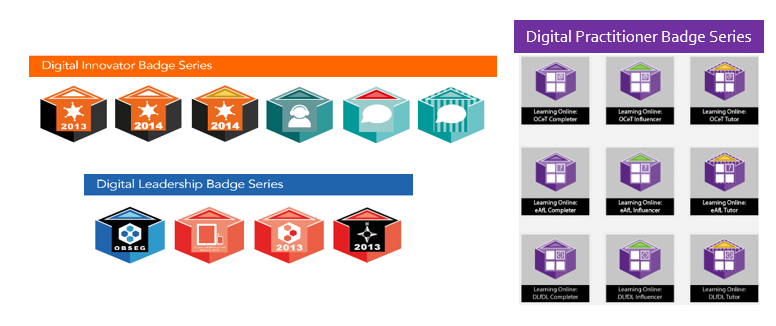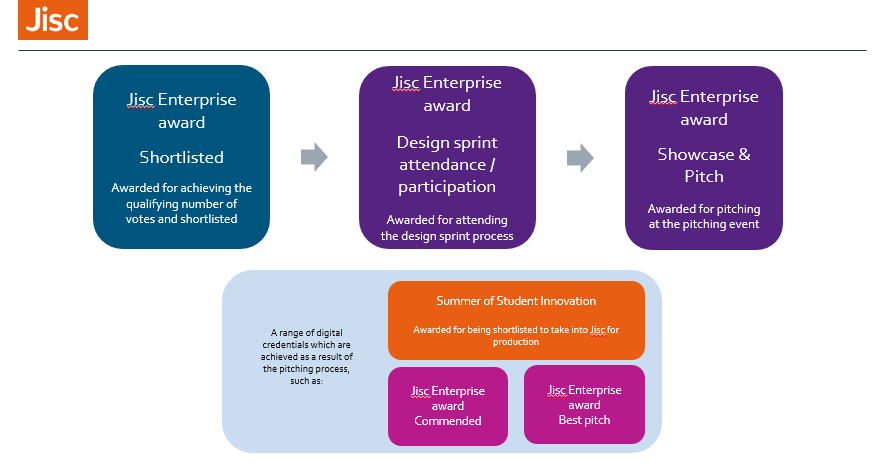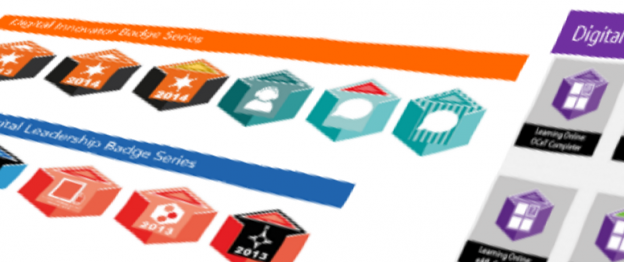This post was originally written by Celeste McLaughlin, who recently started a new role at the University of Edinburgh.
This blog post gives an update on the progress of the Jisc digital credentials project which I’ve been involved with since its inception late last year. My colleague Ruth Drysdale has previously blogged about the project. There are several streams to the project; the first looking at the potential of Jisc providing access to a digital credentials platform, the second is focussing on digital credentials that Jisc may issue, and thirdly to offer advice and guidance to those working in the sector who are interested in issuing digital credentials themselves.
What are digital credentials?
People may be more familiar with the term Open Badges and these are a type of digital credential containing information about the credential. Open Badges are digital rewards based on an open standard (the Open Badge Infrastructure). They are digital images which give a visual representation of achievements, skills, competencies and learning. The badge contains information outlining what the earner has done to be awarded their badge and who has issued the badge.
Open Badges have a number of potential benefits. They can motivate and reward people to participate in activities such as volunteering or charity work, they can identify employability skills such as leadership, communication, and mentoring skills. They can be issued for successfully completing assessments identifying the learning that has taken place and the competencies achieved.
If you are interested in finding out more about the benefits of Open Badges and the difference between digital and open badges, the Badge Alliance have produced a good overview.
Open Badge Initiatives
I first became familiar with Open Badges whilst working at Jisc RSC Scotland, where along with colleagues we developed three Open Badge series:
- Digital Leadership badges were awarded to those who participated in events aimed at digital leaders.
- Digital Innovator badges were awarded for awarded for contribution to forums and webinars.
- Digital Practitioner badges were awarded to participants who had successfully completed all the activities in one of the Learning Online courses available via our training offer. This included a peer awarded influencer badge. The learning online course facilitators noted that the level of participation and collaboration in the online courses increased following the introduction of the influencer badge. Feedback from course participants indicated the badge helped with their motivation and subsequent course engagement.

The Open University are awarding Open Badges to those who successfully complete their Badged Open Courses; in addition to reading the course resources, learners are required to complete online quizzes to earn their badge .
The University of Sussex have issued Open Badges for a range of activities including the 10 Days of Twitter initiative. They have also created a set of badges to recognise and reward staff engagement with CPD activities which have been mapped to the Jisc Digital Capabilities framework.
Edinburgh University Students’ Association (EUSA) are awarding Open Badges to active class reps who have successfully completed Class Rep Online Training, and this achievement will also be recognised on their Higher Education Achievement Report (HEAR). They highlight that earning Open Badges gives students the opportunity to share and showcase their skills and keep a track of their achievements.
There are many more examples of Open Badge initiatives in HE, FE and skills such as the Open Badges awarded to students by Borders College, and the development of an employability passport for students by Sussex Downs College.
What types of digital credentials might Jisc offer?
The potential of issuing digital credentials and there are a number of benefits includes recognising and rewarding the contributions and achievements of people we work with. Ideas are still being discussed and we have been exploring potential badge pathways that could be developed for any digital credential we may offer. This includes issuing digital credentials for individuals, as well as considering the impact that these may have in cascading knowledge and sharing practice at departmental level, and at organisational level. Awarding digital credentials at an organisational level is a new concept, and we’re still exploring how and why we may do this; one example might be for institutions who are have successfully deployed and implemented eduroam.
We may issue badges for attendance and engagement at events and/or training, for the application of knowledge and skills, and for advocacy. Colleagues within Jisc have been exploring issuing Open Badges and ideas to date include the development of a Jisc enterprise award which could be issued to recognise participation in initiatives such as the Summer of Student Innovation.

Jisc digital credentials platform
Discussions with colleagues working in both HE and FE and skills indicates that there is an appetite for Jisc to provide a digital credentials platform/service for the sector. We have commissioned Cetis to undertake a rapid analysis of potential platforms and the Jisc digital credentials project team are currently reviewing two platforms; Credly and the Open Badge Academy. We hope to be able to pilot a digital credentials platform early in the new academic year. If anyone is interested in taking part in the pilot please contact Ruth Drysdale.
If you would like advice and guidance from Jisc on the implementation of digital credentials, speak to Chris Thomson, subject specialist in online learning and the digital student experience.

